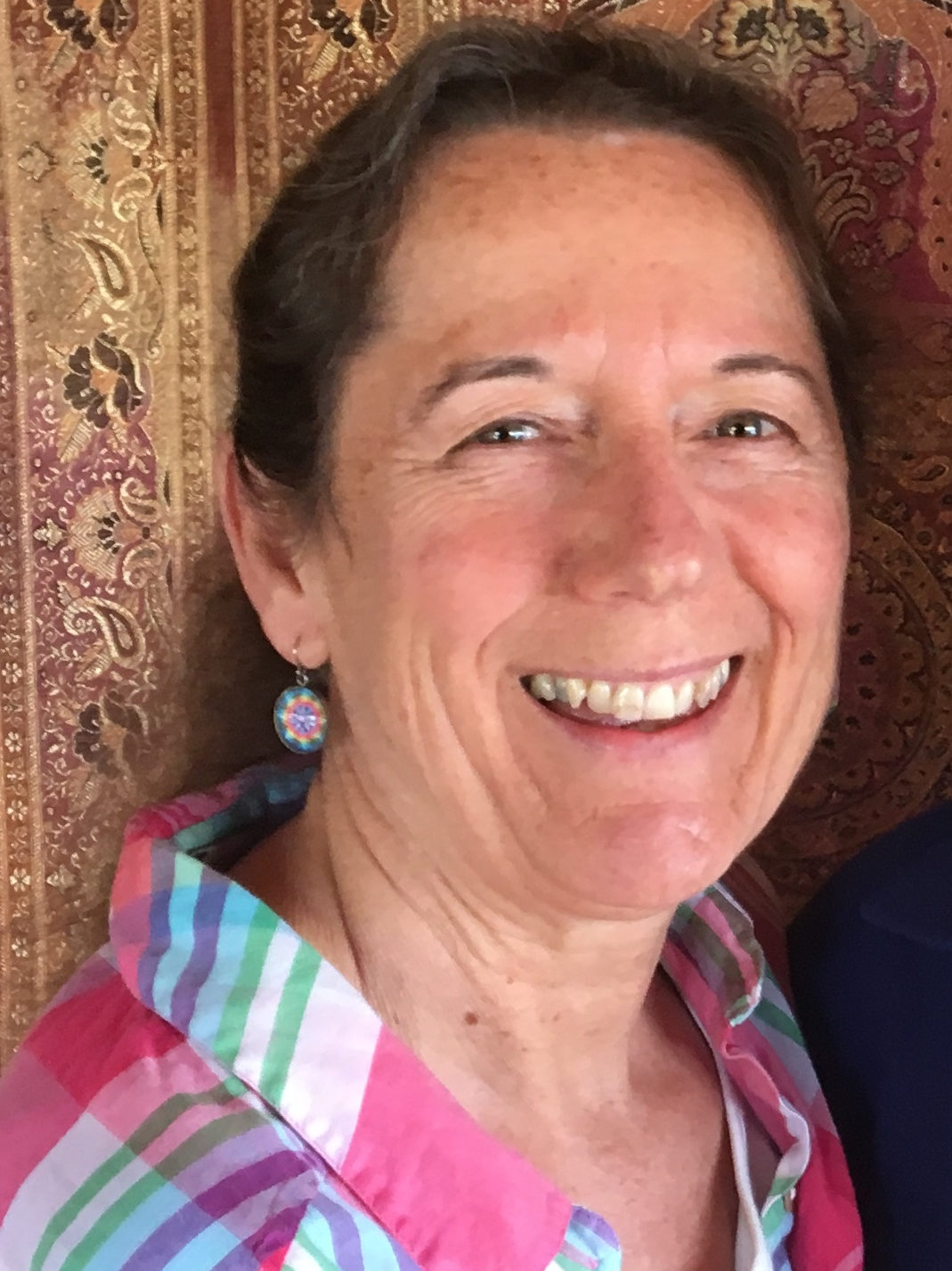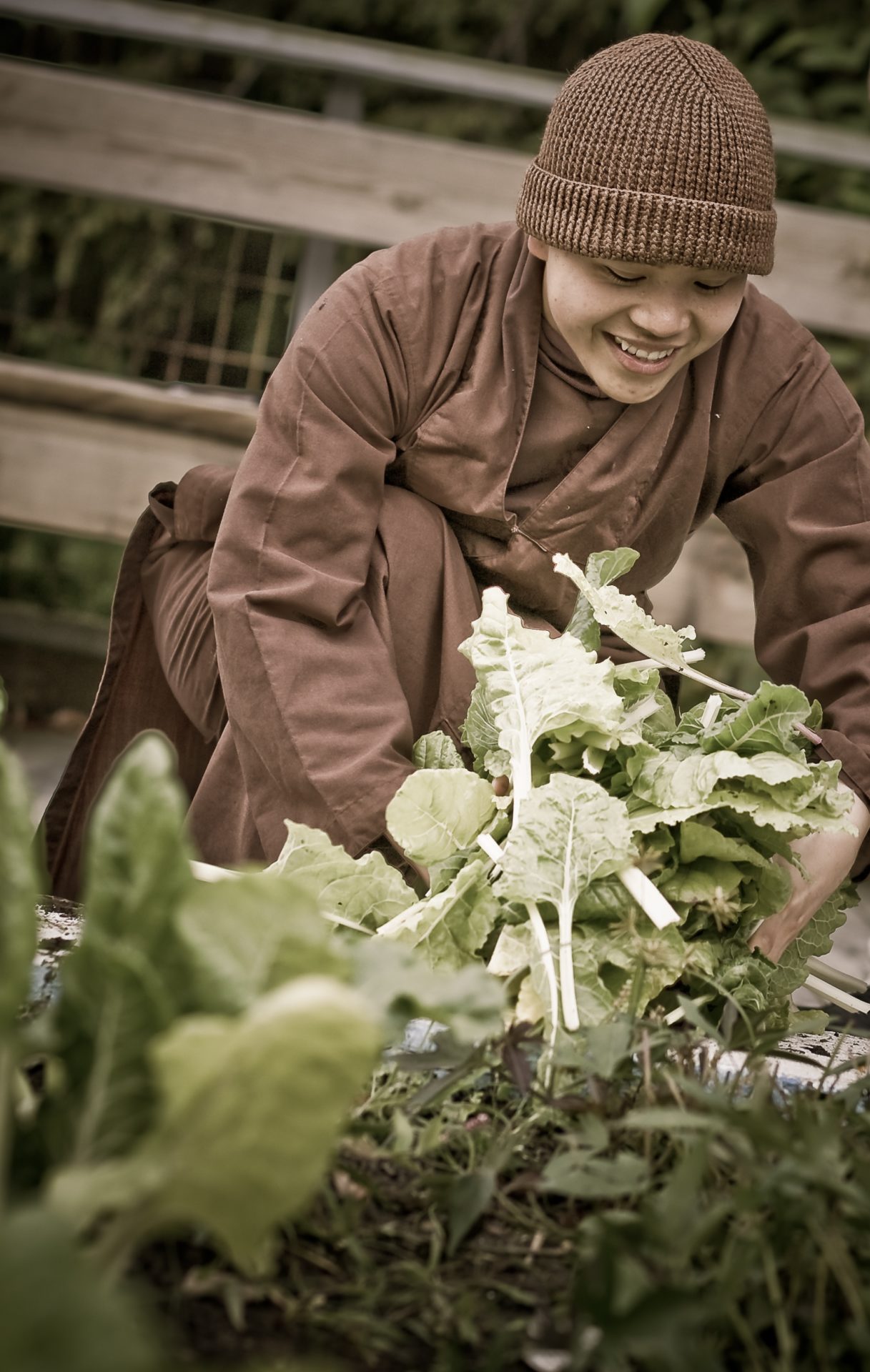By Marge Wurgel

Local Sanghas in the Plum Village tradition have the potential to support practitioners desiring to move toward a more plant-powered or plant-centered way of eating. Our teacher, Thich Nhat Hanh, has asked practice centers to become vegan and has encouraged practitioners to reduce or eliminate animal food consumption. In his famous 2007 letter from Blue Cliff Monastery, Thay wrote:
“Lay communities should be courageous and give rise to the commitment to be vegetarian at least 15 days each month.
By Marge Wurgel

Local Sanghas in the Plum Village tradition have the potential to support practitioners desiring to move toward a more plant-powered or plant-centered way of eating. Our teacher, Thich Nhat Hanh, has asked practice centers to become vegan and has encouraged practitioners to reduce or eliminate animal food consumption. In his famous 2007 letter from Blue Cliff Monastery, Thay wrote:
“Lay communities should be courageous and give rise to the commitment to be vegetarian at least 15 days each month. If we can do that, we will feel a sense of well-being. We will have peace, joy, and happiness right from the moment we make this vow and commitment.
We only need to be vegetarian, and we can already save the Earth. Being vegetarian here also means that we do not consume dairy and egg products, because they are products of the meat industry. If we stop consuming, they will stop producing. Only collective awakening can create enough determination for action.” (1)
It is often easier to make changes if we are supported by others on a similar path, if we practice collective awakening. Joining with Sangha brothers and sisters who want to eat less meat or dairy is a great way to get support, share ideas, and check in when cravings for animal foods arise. Our food habits are deeply ingrained in us, and making the change to less meat and dairy can be difficult, especially when we are surrounded by a culture focused on consumption of animal foods. Joining with other practitioners on a regular basis to support each other’s transition can be extremely valuable.
The Open Heart Sangha in San Diego has offered plant-based cooking classes to its members and is now establishing a Plant-Powered Practitioner Support Network for Sanghas located in the county. The key components of this network are outlined here, with the hopes that other Sanghas will set up similar support systems for practitioners.
PLANT-POWERED PRACTITIONER SUPPORT NETWORK COMPONENTS:
- Identify one or two individuals with plant-based eating experience to help coordinate the network.
- Promote the network gatherings to local Sangha(s).
- Meet on a biweekly or monthly basis.
- Invite people to bring a dish for a plant-based potluck, requesting that no animal products be included.
- When gathered, ask people to briefly describe how they made their dish and be willing to share their recipes.
- Read the Five Contemplations.
- Enjoy the delicious potluck, perhaps eating for the first five or ten minutes in noble silence.
- Arrange in advance to have one person give a simple food-preparation/cooking demonstration, if there is enough time planned for the event. (Alternatively, provide a link to a plant-based cooking demo online.)
- Join in a sharing circle to share joys, successes, challenges, tips, and resources for plant-centered eating.
- Allow time for a question-and-answer discussion.
- Have people briefly share one action they will take in the next week to incorporate more plant foods into their diet.
- Set up a buddy system at the first gathering to enable participants to check in and support one another between gatherings.
APPROACH TO USE:
- Remain positive and gentle.
- Always respect individual differences.
- Use loving speech and deep listening.
- Let go of attachment to one’s beliefs.
- Turn questions to the whole group whenever possible.
POSSIBLE GATHERINGS TO ADDRESS SPECIFIC ISSUES:
If some member(s) of the group are well versed in plant-centered eating issues, the support network may also choose to present special programs on certain topics. These may include:
- Alternatives to meat, dairy, and eggs
- Health effects of a plant-based diet
- Achieving a healthy weight
- Eating away from home (at the workplace, while traveling, in restaurants, and at other people’s homes)
- Revising recipes to be plant-based
- Planning healthy and delicious breakfasts, lunches, dinners, and snacks
- Reading food labels
- Eating plant-centered meals when family members eat animal foods
- Environmental and compassion issues related to food choices
You may also plan a Sangha topic or a Day of Mindfulness based on making compassionate food choices that incorporate our practice. (For a guided meditation on compassionate, plant-centered eating, see p. X.)
May you and your Sangha consider creating a Plant-Powered Practitioner Support Network as a way to respond to Thay’s invitation for collective awakening around food issues.
1 Thay’s letter from Blue Cliff Monastery is available at https://plumvillage.org/letters-from-thay/sitting-in-the-autumn-breeze/.

Marge Wurgel, True Crane Garden, practices with the Open Heart Sangha in San Diego, California. She has been consuming a plant-based diet for twenty-four years. In addition to supporting people in making the transition to this way of eating, she chairs the Plant-Powered team of the Earth Holder Sangha. If you would like assistance or more information to create a Plant-Powered Practitioner Support Network, contact Marge at margewur@gmail.com.
GUIDED MEDIATION ON COMPASSIONATE, PLANT-CENTERED EATING:
By Marge Wurgel
Breathing in, I am aware of my breath as I sit with my Earth-loving brothers and sisters
Breathing out, I am grateful for our shared appreciation of our planet
Aware of my breath
Grateful for our shared appreciation
Breathing in, I feel the interconnections with all beings
Breathing out, I want to live in harmony with all creatures living on the planet
Interconnections with all beings
Living in harmony with all life
Breathing in, I commit to more mindful, compassionate eating
Breathing out, I know this nourishes my body and the Earth’s
Mindful, compassionate eating
Nourishing my body and the Earth’s
Breathing in, I feel compassion for my animal brothers and sisters
Breathing out, I cherish the lives of these animals
Compassion for animals
Cherishing their lives
Breathing in, I reduce my impact on the Earth by making healthy food choices
Breathing out, I consider making more plant-based choices
Reducing impact on the Earth
Choosing more plant foods
Breathing in, I am aware that changing the way I eat may bring up cravings
Breathing out, I know that I am able to feel the sensations and know they are temporary
Changes may bring up cravings
Knowing they are temporary
Breathing in, I see that choosing to eat less animal food may be challenging
Breathing out, I see that the benefits to the Earth and all beings make it easier
Habits are difficult to change
Knowing I’m benefiting all beings makes it easier
Breathing in, I am aware of eating foods that bring peace and joy
Breathing out, I feel happiness when I eat foods that cultivate planetary health
Aware of eating foods that bring peace and joy
Feeling happy
Breathing in, I am aware I don’t have to make the changes alone
Breathing out, I realize many people will support my path of compassionate eating
I don’t have to be alone
Realizing I have support

